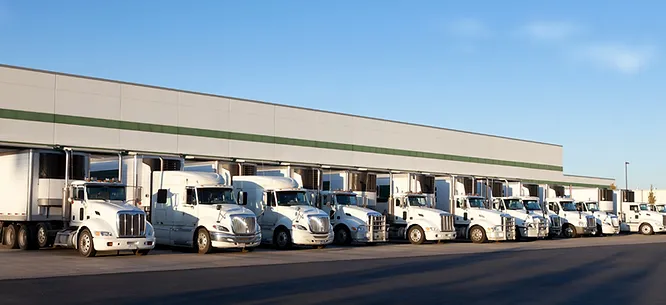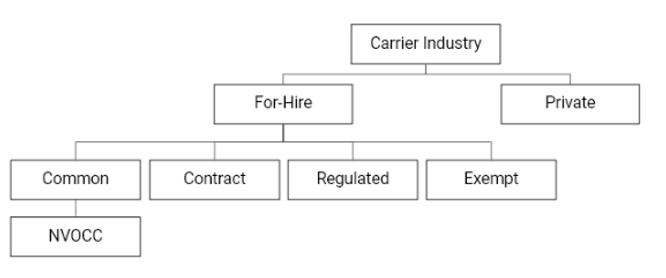Selecting a transporter responsible for handling crucial goods is a challenging decision for many managers. The transportation partner significantly impacts the shipper's operations. It is vital for managers to have criteria to evaluate and select the most suitable partner for the transportation process.
 The Importance of a Transportation Partner
The Importance of a Transportation Partner
To support managers in the evaluation process, we introduce a guide to evaluating transporters based on several objective criteria. Depending on the company's business needs, identify the most critical criteria and use them to select the appropriate provider.
1. Types of Transporters
Transporters are companies that provide air, sea, or road transportation services. There are two main types of transporters: private and for hire. A private transporter will provide services for companies and industries that need to own or lease vehicles, without additional fees beyond the service fee. In contrast, a for-hire transporter will provide services to the public for a fee, adhering to government regulations regarding pricing, routes, and served markets.
 Types of Transportation Partners
Types of Transportation Partners
-
Private Transporters: This group provides exclusive transportation within an organization. Private fleets are used to transport goods from the supplier, helping reduce overall operating costs. Most personal vehicles, such as cars and pickup trucks, can act as advertising tools, functioning as "mobile billboards."
-
Common Carriers: All transportation means are public, and the carrier does not offer special service packages for any particular organization. Regulations for these carriers typically depend on pricing, liability, and services provided.
-
Contract Carriers: These companies do not serve the general public but lease transportation with a limited number of drivers under a specific contract. They are not obligated to provide services to the public and only serve contracted customers.
-
Exempt Carriers: These are for-hire carriers but are not subject to economic law, such as taxis or freight trucks. They are not restricted by routes, service areas, or pricing. Their exemption conditions are determined by the type of products transported and the nature of the organization.
-
NVOCC (Non-Vessel Operating Common Carrier): These companies operate in the field of sea freight forwarding, considered sea carriers (Carriers) but different from shipping lines (Shipping Line) in that they do not own any vessels. NVOCC operations include sales, cargo loading, and container transport to ports. Bill of lading and distribution issues abroad are managed by NVOCC agents.
2. Factors to Consider When Evaluating a Transporter
a. Cost and Quality of the Transporter
Cost is a decisive factor in selecting a transporter and often one of the pieces of information that the service provider must meet. In addition to service fees, companies will check the quality of services provided by potential partners. Along with time factors, these elements help managers reduce risks when selecting a suitable partner for the company.
 Factors to Consider When Evaluating a Transporter
Factors to Consider When Evaluating a Transporter
b. Delivery Time and Reliability
A transporter should be chosen based on speed and reliability. Business success depends on goods being transported timely to the required locations. A reliable partner will build a positive image for your company and help grow your business by meeting customer needs. Choosing a transparent partner in communication is also crucial. The transporter will be more responsible for the shipment, and you will not have to worry about the condition of the goods.
c. Services and Capacity
The transporter under consideration must have the capacity to meet the company's transportation needs. Ask questions such as: What services does the transporter provide? Do these services meet your company's requirements? The transporter must have the necessary equipment and resources, as well as the ability to ensure the quality of the shipment.
 Geographic Coverage is a considerable factor
Geographic Coverage is a considerable factor
d. Geographic Coverage
Choosing a transporter that can provide services on your goods' transportation route with the required frequency is also an essential factor. If the company intends to establish a long-term, mutually beneficial relationship, consider both current and future goals.
e. Product Protection
Safety is of great significance to a company and its customers. A transporter with a low accident rate and higher service fees is still more optimal than a provider with lower service fees but an alarming accident rate. In case of an accident, the carrier's communication and handling processes must comply with organizational standards. A transporter that prioritizes safety will help the company build a stable reputation, leading to increased sales.

Stability and Sustainable Growth
f. Stability and Sustainability
A stable transporter in the market will ensure service productivity for your company's transportation needs. In the long run, the company will benefit significantly from negotiating with a partner with a stable market position and sustainable growth rate.
In line with 21st-century trends, transporters should adhere to sustainability goals and environmental awareness. Among two reputable companies, today's customers tend to choose the more environmentally friendly one.
Effective Evaluation and Selection of Carriers